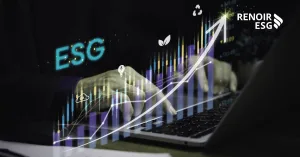At a Glance:
Previous article explored how organisations can adopt AI-driven data practices to refine the sustainability aspects of their business strategy.
This article shifts the focus from AI in strategy to AI in action, highlighting how various industry players are embedding AI into their sustainability efforts and what sets high performers apart.
Between 2022 and 2023, the AI in ESG and sustainability market, in the energy and utilities sector, grew from $38.22 billion to $45.46 billion, underscoring rising investment in digital solutions for environmental and social performance. In these sectors, AI is driving efficiency through real-time monitoring, predictive analytics, and automated reporting, supporting objectives such as carbon footprint reduction and energy optimisation through smart grid integration and advanced metering infrastructure (AMI).
In supply chain and manufacturing, AI in ESG plays a pivotal role in reducing emissions, improving energy efficiency, and supporting circular economy practices. It enables waste reduction by detecting inefficiencies, supports material reuse through product lifecycle tracking, and streamlines logistics to cut unnecessary energy use.
This article explores the transformative impact of AI on ESG and sustainability, highlighting its practical applications across various industries.
But how exactly are leading organisations embedding AI to meet ESG goals in real-world settings?
How AI Drives Sustainability Across Sectors
Technology sector: Accelerating Climate Forecasting with AI
Microsoft Research’s AI for Science team developed Aurora, a foundation model designed to forecast global weather patterns and atmospheric processes, including air pollution, with unmatched speed and accuracy. Trained on over 1 million hours of climate simulations and powered by 1.3 billion parameters, Aurora can operate up to 5,000 times faster than current forecasting systems used by meteorological services. Crucially, it performs well even in data-scarce regions and during extreme weather events. This innovation demonstrates how AI can enhance climate resilience, improve air quality forecasting, and support businesses and governments in environmental risk management.
Environmental Management Sector: Real-Time Monitoring with AI
Sector-agnostic companies are using AI-powered sensors and analytics to monitor air quality, water usage, and carbon emissions in real time. Based on this study by Nature, these systems enable faster detection of environmental risks and allow enterprises to take corrective action before issues escalate. Leveraging machine learning and big data analysis, AI enhances predictive modelling, helping companies identify pollution trends, optimise resource use, and strengthen compliance with environmental standards. This shift towards intelligent environmental management is making ESG strategies more responsive, measurable, and outcome-driven.
Financial Services: AI-Driven ESG Risk Intelligence at United Overseas Bank (UOB)
United Overseas Bank (UOB) is leveraging advanced AI technologies to strengthen how it assesses and manages ESG risks across its financed assets. AI automates the evaluation of key ESG indicators such as Scope 1, 2 and 3 emissions, climate and biodiversity risks, and compliance requirements—enhancing both coverage and consistency. By consolidating complex ESG data streams, the system reduces manual processing, supports faster decision-making, and improves the quality of insights used in sustainable finance deals.
Additionally, the University of Strathclyde’s research reveals how Generative AI can streamline complex ESG reporting for financial institutions. By automating data summarisation, visualisation, and regulatory compliance, it reduces bottlenecks in ESG disclosures and enhances transparency.
Energy Transition: Ørsted’s AI-Powered Optimisation of Wind Energy
Managing over 1,500 offshore wind turbines across the globe, Ørsted faces significant logistical and operational complexity. To reduce downtime and improve asset performance, the company has embedded AI and advanced analytics into its digital strategy. Using platforms such as Azure, Ørsted processes vast volumes of turbine data in real time, enabling predictive maintenance and intelligent resource allocation. This approach transforms raw operational data into actionable insights, helping to minimise unplanned outages and improve efficiency across dispersed sites. Since initiating its transition in 2006, Ørsted has reduced its CO₂ emissions by over 80%.
Did you know?
According to a whitepaper by the World Economic Forum in 2025, the financial sector has seen substantial growth and investment in Artificial Intelligence (AI), with firms spending $35 billion on AI in 2023, and projected investments expected to reach $97 billion by 2027 across banking, insurance, capital markets, and payments.
Risks of AI-Driven ESG Integration
The integration of Artificial Intelligence (AI) into ESG practices, while offering transformative potential, also presents several significant risks and challenges that organisations must carefully manage.
These challenges highlight that AI is not a “one-size-fits-all” solution and its adoption should be based on a clear understanding of an organisation’s specific needs and its ability to implement AI responsibly, with significant human oversight and ethical considerations.
Some of the risks include:
- Increased digital connectivity heightens exposure to cyberattacks, which could compromise sensitive operational, environmental, or employee data.
- Data silos, where information is stored in isolated systems (e.g., HR, operations, finance, procurement), hinder AI systems from accessing and analysing comprehensive datasets, limiting their effectiveness.
- AI models can produce inaccurate, misleading, or biased results if trained on flawed or biased data.
- Skills gap within workforce of talent pool to develop, manage, and utilise AI systems.
RenoirESG Advisory for AI-Driven Sustainability
Renoir ESG helps organisations and CSOs integrate AI into their ESG strategies with end-to-end consulting. Leveraging deep expertise in gap analysis, data management, and stakeholder engagement, Renoir ESG supports companies in assessing ESG-AI readiness, integrating siloed data across functions, and identifying risks such as bias, cyber threats, or poor data quality. We also focus on capability building and change management to drive adoption.
Let’s build a smarter ESG future.












